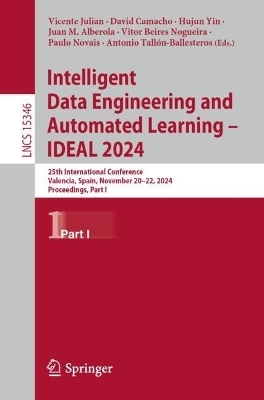
Intelligent Data Engineering and Automated Learning – IDEAL 2024
Springer International Publishing (Verlag)
978-3-031-77730-1 (ISBN)
This two-volume set, LNCS 15346 and LNCS 15347, constitutes the proceedings of the 25th International Conference on Intelligent Data Engineering and Automated Learning, IDEAL 2024, held in Valencia, Spain, during November 20-22, 2024.
The 86 full papers and 6 short papers presented in this book were carefully reviewed and selected from 130 submissions. IDEAL 2024 is focusing on Big Data Analytics and Privacy, Machine Learning & Deep Learning for Real-World Applications, Data Mining and Pattern Recognition, Information Retrieval and Management, Bio and Neuro-Informatics, and Hybrid Intelligent Systems and Agents.
.- Quantitative Estimation of Reputation Risk.
.- Dissecting Data Practices in Android Apps: A Comparative Study of Data Collection and Sharing Behaviors.
.- Model-Based Meta-Reinforcement Learning for Hyperparameter Optimization.
.- Towards Sustainable Precision: Machine Learning for Laser Micromachining Optimization.
.- Association Rules Mining with Auto-Encoders.
.- Using Contrastive Learning to Map Stylistic Similarities in Narrative Writers.
.- Automatic classification of signal and noise in functional magnetic resonance imaging scans using convolutional neural networks.
.- How Resilient are Language Models to Text Perturbations?.
.- Emotional Sequential Influence Modeling on False Information.
.- CSSDH: An Ontology for Social Determinants of Health to Operational Continuity of Care Data Interoperability.
.- Padel two-dimensional tracking extraction from monocular video recordings.
.- Drowsiness Detection Using Vital Sign Sensors and Deep Learning on Smartwatches.
.- Benchmarking out of the box Open-Source LLMs for Malware Detection based on API Calls sequences.
.- Multimodal Visio-lingual Content Analysis to Detect Fake Content on Reddit.
.- MetaLIRS: Meta-learning for Imputation and Regression Selection.
.- Pipeline for Semantic Segmentation of Large Railway Point Clouds.
.- Preliminary Investigation on Machine Learning and Deep Learning Models for Change of Direction Classification in Running.
.- Efficient Radar Scheduling Using Genetic Algorithms and Stochastic Heuristic Initialization.
.- Towards a Communication Specification Language for Heterogeneous Service Orchestration based on Process Calculus and Holonic Multi-agent Systems.
.- Counterfactual Explanations for Sustainable Tourism Indicators.
.- Tracking Healthy Organs in Medical Scans to Improve Cancer Treatment by Using UW-Madison GI Tract Image Segmentation.
.- Low consumption models for disease diagnosis in isolated farms.
.- Fast and Scalable Recommendation Retrieval Model with Mixed Attention and Knowledge Distillation.
.- Federated Learning for Vietnamese SMS Spam Detection using Pre-Trained PhoBERT.
.- Deep Learning Inference on Edge: A Preliminary Device Comparison.
.- Causal Explanation of Graph Neural Networks.
.- The contribution of social sciences driven user studies to the development of human-centered artificial intelligence.
.- Towards Reliable Drift Detection and Explanation in Text Data.
.- Using Diffusion Models for Data Augmentation on Limited Rodent OCT Datasets.
.- Employing Explainable AI techniques for Air Pollution: An ante-hoc and post-hoc approach in dioxide nitrogen forecasting.
.- Predicting employee attrition in a multi-company setting.
.- A deep-learning approach for the identification of new subtypes of lung cancer .
.- Loss Function Role in Processing Sequences with Heavy-Tailed Distributions.
.- Cooperative-Competitive Decision-Making in Resource Management: A Reinforcement Learning Perspective.
.- Improving Speech Emotion Recognition: Novel Aggregation Strategies for Self-Supervised Features.
.- Refining Multiple Instance Learning with Attention Regularization for Whole Slide Image Classification.
.- Evaluating performance and trustworthiness of RAG systems for generating administrative text.
.- Blueprint of Tomorrow: Contrasting Off-line and On-line Drawing Tasks for Alzheimer's Disease Screening.
.- Digital Mental Health Apps: Key Features and User Engagement for Better Wellness.
.- Automatic PDF Document Classification with Machine Learning.
.- Contributions on Mixtures of Polynomials for Hybrid Bayesian Networks.
.- Age-unbiased Facial Emotion Recognition with Regularizing Self-attention Value Vector.
.- Assessing the Impact of Temporal Data Aggregation on the Reliability of Predictive Machine Learning Models.
.- Topic modeling in Telegram channels during the Russia-Ukraine conflict.
.- Structural and Semantic Data Layers in Time Series Analyses.
| Erscheinungsdatum | 21.11.2024 |
|---|---|
| Reihe/Serie | Lecture Notes in Computer Science |
| Zusatzinfo | XXVIII, 516 p. 163 illus., 144 illus. in color. |
| Verlagsort | Cham |
| Sprache | englisch |
| Maße | 155 x 235 mm |
| Themenwelt | Informatik ► Datenbanken ► Data Warehouse / Data Mining |
| Schlagworte | Applied Computing • Artificial Intelligence • Bioinformatics • Computing Methodologies • data analytics • data management systems • Data Mining • Deep learning • deep neural networks • Health Informatics • Human Computer Interaction • Information Retrieval • machine learning • neural informatics • Neural networks • Neural systems • web applications |
| ISBN-10 | 3-031-77730-1 / 3031777301 |
| ISBN-13 | 978-3-031-77730-1 / 9783031777301 |
| Zustand | Neuware |
| Informationen gemäß Produktsicherheitsverordnung (GPSR) | |
| Haben Sie eine Frage zum Produkt? |
aus dem Bereich


